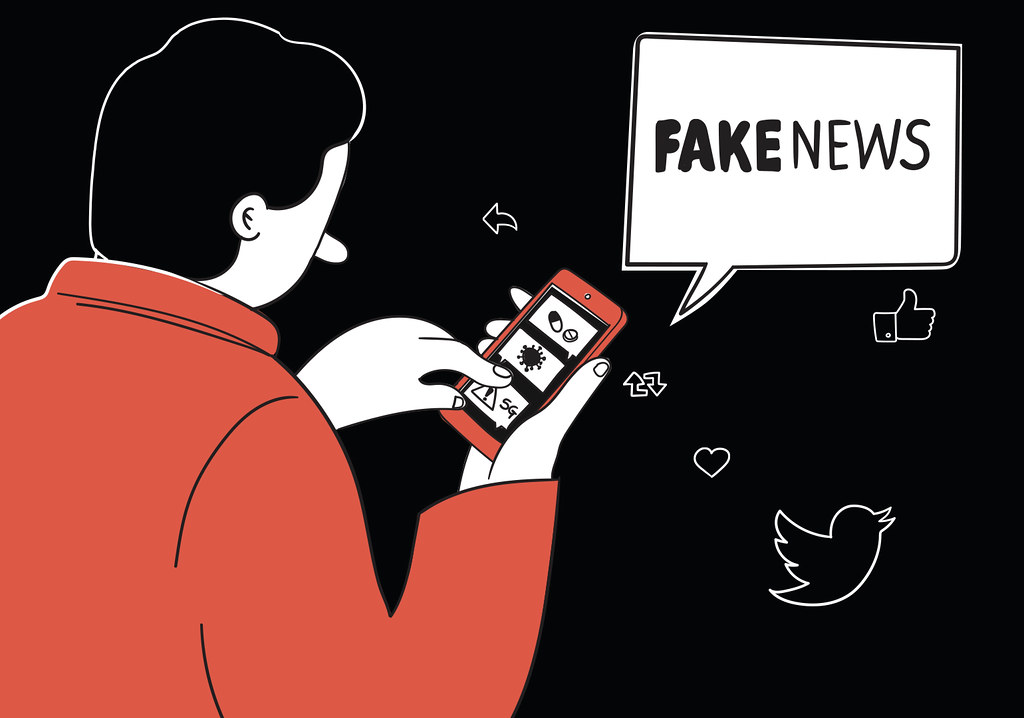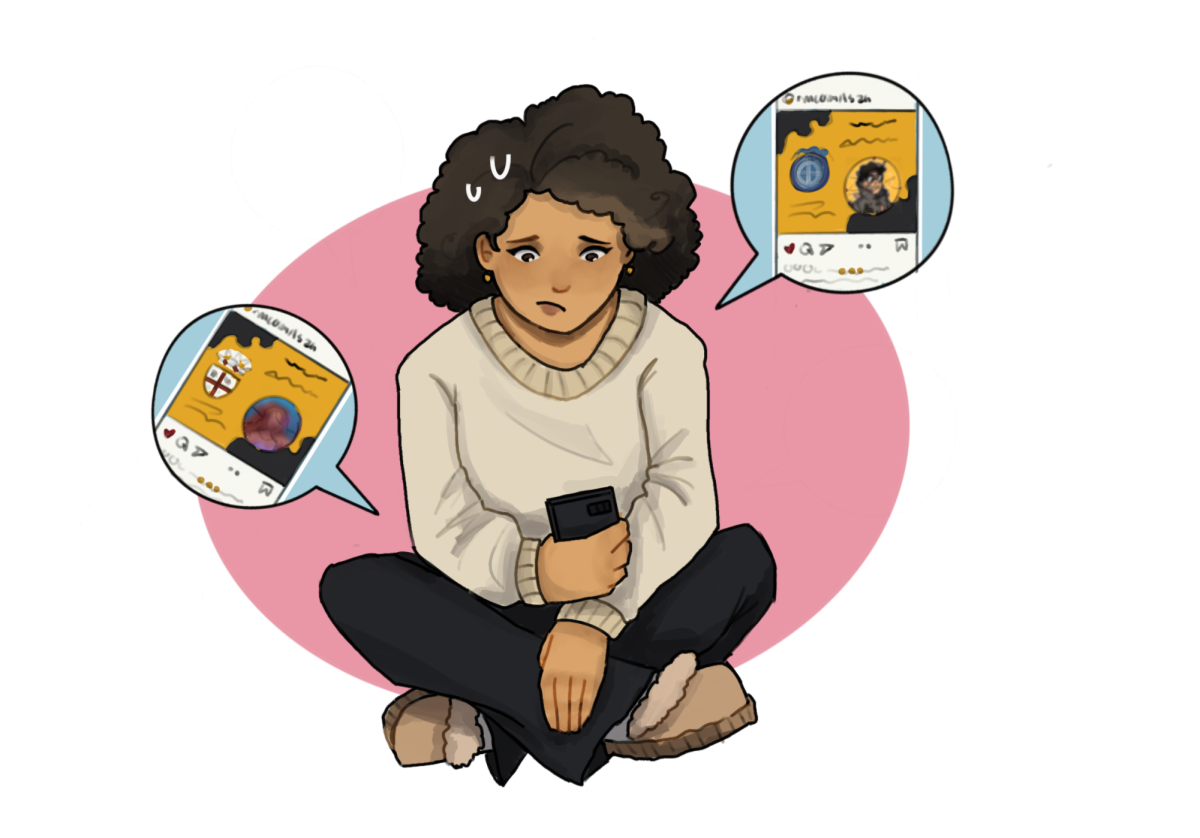Memes and trends on social media have become a staple of American news culture. On a superficial level, they function as a source of light humor, but can also serve as visual communication for breaking news and current events. Given their humorous appeal, especially to youth, many are becoming informed through memes. According to the Pew Research Center, at least half of American adults claim that they consume some news on social media sites, and a third of adults under 30 regularly get their news from TikTok. However, social media allows for a plethora of opinions and perspectives to proliferate through memes and other trends, and this overstimulation can result in desensitization of the public, creating the possibility of violence and destruction.
Desensitization can become a result of graphic and highly emotional topics, such as gun violence or wars, being constantly broadcasted on the news. Typically, people do not give themselves enough time to process significant events; they resort to “doomscrolling” through negative news cycles. The main effect of emotional desensitization is a lack of empathy. A Method Communications survey of 2,000 Americans found that 43 percent of consumers believed social media is to blame for declining social empathy. This is because of the constant stream of violent media; viewers start to feel less strongly towards events because it seems “normal” to see tragic events become less of a “shocking” evil.
“We want to be informed and learn about the world, and unfortunately, we’re innately tuned to the negative,” the head of a social media lab at Stanford University, Jeff Hancock, said in an interview. “‘If it bleeds, it leads,’ and that is what these algorithms have picked up on.”
One instance in which memes have become wildly popular is through politics. Online humor is a way for youth especially to be involved in civic engagement. The Trump-Harris race created significant uproar across social media. For example, during the 2024 ABC News Presidential Debate, President-elect Donald Trump made false comments about Haitian immigrants eating pets in Springfield, Ohio. Soon after the debate concluded, several musical remixes mocking his claims were shot around social media platforms. “[Memes are] a way to comment on politics, both possibly to like, mock people you don’t like, praise people you do like, or just generally, to mock the state of, like, American politics in general,” Honors and AP U.S. History teacher Nathaniel Mason said.
Although superficially humorous, the principle behind Trump’s comments is regarding immigration, one of his central policy goals. “Meme-ifying” his claims that were proven false can be seen as insensitive to the actual issue, which affects millions of people living in America. “You could have had actual conversations about what was happening,” conservative talk show host Erick Erikson said. “The problem was not people eating pets.”
According to CNN, after the 2024 Presidential debate, Springfield received over 35 threats of violence, including bomb threats. In this way, memes can become dangerous, as they blur the line between satire and disinformation, creating the possibility of violence and destruction. However, regardless if one views meme culture as insensitive, at the very least, it can highlight societal issues. “[Meme culture is] sardonic, it’s, it’s satirical, it’s sarcastic…it’s not just for the gratuitous humor value. It’s, it’s to illustrate a problem,” said NSL Government teacher Noah Grosfeld-Katz.
In the context of Trump’s claims, memes did create awareness of the debate and the election in general. “In this example, [what Trump was] saying about the Haitian immigrants was so wildly untrue and proven untrue that I don’t have a problem with a meme portraying just how untrue it is by using certain images…the point is to get people to realize that what Trump said is unbelievably ridiculous,” Mr. Grosfeld-Katz said.
Nevertheless, social media and meme culture have allowed historical events universally deemed too devastating and delicate to twist to come into the equation. Until recently, events like 9/11, one of the darkest days in American history, were thought of as too painful and sensitive for anyone to joke about. But now, their effects are rapidly disappearing from our collective memory, especially among younger generations.
According to More in Common polls, younger Americans are more likely not to know what the saying “Never Forget” means, a popular phrase used to honor the victims of 9/11, and are less likely to state it had a significant impact on their lives. As 9/11 moves farther away, people become even more detached from its effect and are more okay with making jokes about the situation because it isn’t in their scope of attention. A prime example is the famous photo of President Bush being made aware of the second plane crash into the Twin Towers, a sensitive moment that was made a vessel for various internet memes.
As more memes and dark humor arise regarding these topics, people who obtain most of their knowledge from social media will maintain an unserious attitude to such situations. “I mean, you’re getting a very simplified version of things, [from internet memes] and one that is almost assuredly slanted. Whoever made the meme has an angle … they’re trying to convince something,” Mr. Mason said. Therefore, instead of younger generations consuming informative information regarding the attack, they are fed an unserious version heavily influencing their perception of such an event. “Younger kids, if the way that they’re learning about historical events is from like memes that are, you know, definitely not the full picture … I don’t think that’s good. I think that, like, you know, we should aim for knowledge of historical events through like, nuanced instruction.”
The COVID-19 pandemic is another relevant example due to its recency. The effects were immediately felt after COVID-19 was declared a global pandemic in 2020. Schools shut down, classes went online, and millions lost their jobs. Stuck at home, people generally watched the news or resorted to “doomscrolling” to keep busy. As people were continuously exposed to the growing number of deaths and new outbreaks across the world, a sense of normalcy emerged. A study by JMIR Publication observed the effect of fear-inducing health messages on anxiety on X (formally known as Twitter). It showed that over time constant exposure to death tolls and other negative information resulted in blunted emotional responses and diminished anxiety as there was less sensitivity to the threat.
Coupled with the constant quarantine memes of being stuck at home or panic buying, the true gravity of the situation disappeared into the background. “I think it [social media memes] kind of adds a level of just like superficiality to the event [COVID-19], and kind of just glamorizes it. You know, it’s like making a joke about a traumatic event that happened in the past … except for a lot of people who are making these memes, it didn’t happen to them,” said sophomore Aariana Rao.
In more recent news, gun violence incidents have gained national traction, such as the September Georgia school shooting. On September 5, 2024, Colt Gray, a fourteen-year-old, was suspected to have killed four and injured nine at Apalachee High School in Georgia.
Gray’s intentions were later discovered through the social media platform Discord. This is unfortunately unsurprising. Social media is highly linked to gun violence, as it serves as a medium in which little arguments can blow up into something deadly. “I definitely think social media is responsible for a lot of the problems we’re seeing amongst young people today and… the inflammatory political climate, because these algorithms create an echo chamber,” Mr. Grosfeld-Katz said.
Social media is inherently and intentionally addictive and can be easily manipulated or misunderstood. “I think people do like seeing images or opinions that conform to their already previously held beliefs, to understand that they’re not alone in thinking what they think…it feels good to feel like you are part of a community of people out there that think you’re not crazy for thinking what you think,” he added. But, in this context, someone who wants to perpetuate gun violence will find other people with the same ideals, and being validated in such a way is dangerous.
Ultimately, understanding news and the world around us comes down to combating misinformation and desensitization. As the future generations rely more on social media to obtain their news, they should first understand the difference between real news and caricatured information. Therefore, it is vital to look for sources that provide clear accounts of events and to take serious events at face value to truly understand their impact.
Social media sites could potentially make changes by changing their algorithms to flag videos and posts that may contain misinformation. Rather than banning these posts altogether, these flags would simply raise awareness that a post may not be factually correct. For younger people, teachers and professors should actively engage their students in discussions about current events, so that people do not resort to passively scrolling on their phones. “People should seek out multiple sources of information. That’s really the only way to have a greater understanding of the issue. So people should not rely on memes for their news,” Mr. Grosfeld-Katz said. Being aware of multiple perspectives and opinions also allows for greater discourse and debate on the real issues.
If you would like to voice your opinion on an issue you feel is relevant to our community, please do so here. Anyone is able and welcome to submit a Letter to the Editor, regardless of journalistic experience or writing skills. Submissions may be published either online or in a print issue.







